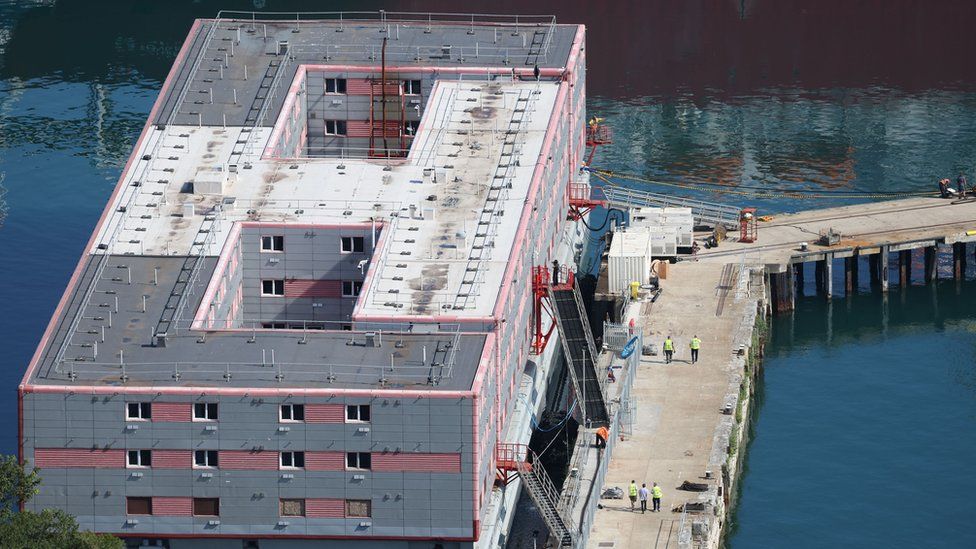ARTICLE AD BOX
 Image source, EPA
Image source, EPA
The news will be a blow to a flagship part of the government's plan to deter Channel crossings by migrants
By Ione Wells & Joe Nimmo
Political correspondent
Migrants are being temporarily removed from the Bibby Stockholm barge after traces of Legionella bacteria were found in the water.
The BBC understands that routine testing was done before migrants moved on to the vessel, moored in Dorset.
But test results showing traces of the bacteria came back only after migrants had moved to the barge.
The Home Office said the 39 migrants onboard the barge had been disembarked while assessments are carried out.
Legionella is the bacteria that can cause Legionnaires disease - a type of pneumonia.
The BBC has been told that while migrants have used the water supply on board, none have so far showed symptoms, but have been removed from the barge as a precaution.
Another test has also been done since, and it is expected that migrants will be moved back on if and when the water supply is all clear of the bacteria.
The BBC understands the UK Health and Security Agency has recommended further testing of the water supply.
'No individual has symptoms'
Government sources have said they are complying with the UKHSA guidance and have gone "above and beyond" what has been recommended by removing people from the barge temporarily.
The first residents of the barge only went on board this week after a series of delays attributed to fire safety concerns.
The vessel - moored at Portland Port on the south coast - is part of the government's plan to "stop the boats" and deter Channel crossings by migrants.
The government has been planning to house up to 500 men aged 18-65 on Bibby Stockholm while they await the outcome of asylum applications.
A Home Office spokesman said: "No individuals on board have presented with symptoms of Legionnaires', and asylum seekers are being provided with appropriate advice and support."The samples taken relate only to the water system on the vessel itself and therefore carry no direct risk indication for the wider community of Portland nor do they relate to fresh water entering the vessel. Legionnaires' disease does not spread from person to person."
Legionella bacteria can cause a serious infection called Legionnaires' disease.
The bacteria are normally found in rivers and lakes, but can also make their home - and grow in large numbers - inside water tanks and plumbing systems.
This becomes a problem when people breathe in infected water and the bacteria get into the lungs.
Something like a shower that creates a mist of water carrying the Legionella bacteria would pose a risk.
Once in the lungs, the bacteria lead to pneumonia and symptoms can include a cough, shortness of breath and a fever.
People infected will need antibiotics and in more severe cases oxygen support or even machines to help them breathe.
Follow BBC South on Facebook, Twitter, or Instagram. Send your story ideas to south.newsonline@bbc.co.uk.
You can receive Breaking News on a smartphone or tablet via the BBC News App. You can also follow @BBCBreaking on Twitter to get the latest alerts.
Related Internet Links
The BBC is not responsible for the content of external sites.

 1 year ago
27
1 year ago
27








 English (US) ·
English (US) ·